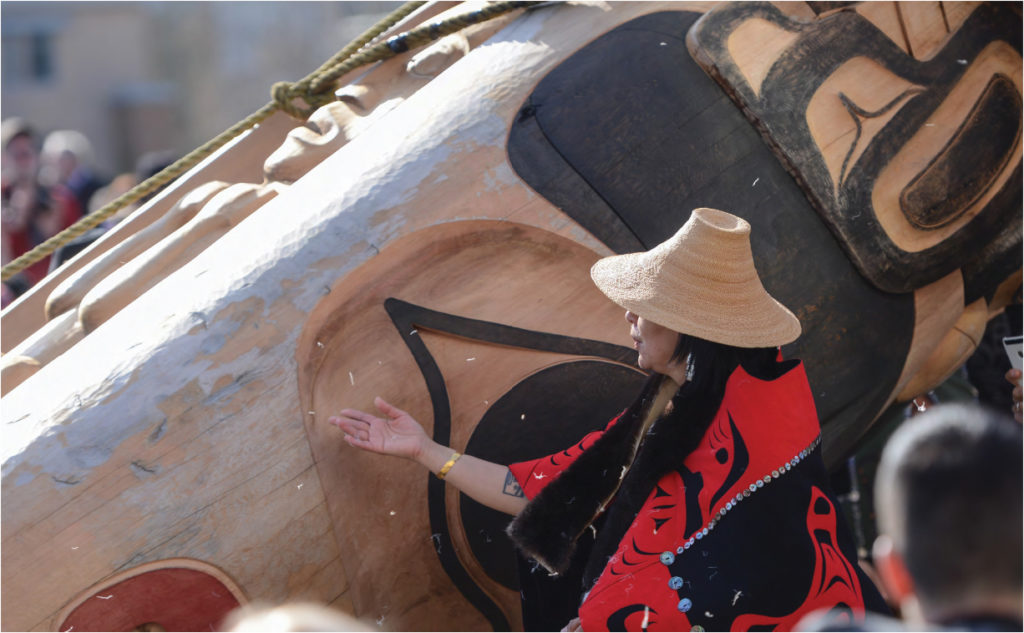
Created with input from more than 2,500 students, faculty and staff across our campuses – both Indigenous and non-Indigenous – as well as from Indigenous community partners, UBC’s new Indigenous Strategic Plan is an important milestone in UBC’s commitment to truth and reconciliation. Launched this month, the plan represents a university-wide response to the United Nations Declaration on the Rights of Indigenous Peoples and the National Inquiry into Missing and Murdered Indigenous Women and Girls’ Calls for Justice. It also represents the UBC Vancouver campus’ response to the Truth and Reconciliation Commission’s Calls to Action.
“We’ve come a long way over the past decade in particular, but the engagement process highlighted the reality that there’s still a long road ahead in order for us to see our Indigenous students, faculty, staff and partners not just survive but thrive,” says Dr. Margaret Moss, plan co-lead and Director, First Nations House of Learning at UBC.
“We want to ensure our campuses are places where Indigenous students, scholars and knowledge keepers truly feel welcome and are able to reach their fullest potential. We want our campuses to prominently reflect and celebrate cultures and traditions of the Indigenous peoples on whose territories they are located.”
The plan, intended as a guiding framework for faculties, units and portfolios to develop their own plans, outlines eight goals and 43 actions the university will collectively take to advance its vision of UBC as a leading university globally in the implementation of Indigenous peoples’ human rights (Strategy 17: Indigenous Engagement). It seeks to amplify Indigenous voices across our campuses and guide our collective action towards a more just and equitable future for all. Hear from some of UBC’s Indigenous faculty and staff about how their experiences motivated them to get involved with creating the plan.
Vicki George, Assistant Director, First Nations House of Learning
Margaret Moss, Director, First Nations House of Learning
Amy Perreault, Senior Strategist for Indigenous Initiatives, Centre for Teaching, Learning and Technology
UBC is the first university in North America to commit to implementing the United Nations Declaration on the Rights of Indigenous Peoples, and to take a human rights-based approach to its Indigenous strategic framework. To celebrate this milestone, President Santa Ono hosted a virtual event on September 14 on our Vancouver campus, located on the traditional, ancestral and unceded territory of the Musqueam people. The celebration featured supportive words and sage advice from many Indigenous leaders. From Grand Chief Stewart Phillip to Grand Chief Wilton Littlechild, Musqueam Chief Wayne Sparrow, Elder Larry Grant, The Honourable Marion Buller, and Professor Kristen Carpenter from the UN Expert Mechanism on the Rights of Indigenous Peoples, these leaders offered their thoughts on the significance of the ISP in moving UBC towards genuine reconciliation. Grand Chief Phillip said it best when he instructed those implementing the plan “not to sit on your gifts but to express what is in your heart and on your mind freely.”
Watch the recording of the event here, including the spectacular performance by Tsatsu Stalqayu, Coastal Wolf Pack.
A future celebration will be planned for our Okanagan campus, located in the unceded territory of the Syilx Okanagan Nation. This milestone builds on the UBCO community’s declaration of Truth & Reconciliation commitments last year, explains Adrienne Vedan, Senior Advisor to the UBC Okanagan Deputy Vice-Chancellor on Indigenous Affairs.
“Seeing the university’s Indigenous Strategic Plan launch is an exciting and a crucial next step for our community as it allows us to continue to build upon the important work that has already been done, and the new direction drives us to mobilize further action and accountability in this area.”
The plan commits to reviewing university policies and practices to ensure they live up to the requirements of the UN Declaration and other human rights standards. As one aspect of this commitment, UBC will work with Indigenous communities and partners to co-develop research protocols consistent with the imperatives of free, prior and informed consent and ownership and control of Indigenous knowledge and information. Other intended impacts include:
- Catalyzing research with and for Indigenous peoples, with appropriate protocols
- Developing deeper research and operational partnerships with host nations and other Indigenous communities
- Enhancing Indigenous content and scholarship through curricula
- Better recognition of Indigenous knowledges in scholarship
- Providing public education tools and dialogues
- Placing more Indigenous individuals in leadership roles
- Recruiting more excellent Indigenous students, faculty and staff
- Changing financial procedures in order to fairly compensate Indigenous knowledge holders in a timely manner
The new Indigenous Strategic Plan acknowledges our collective responsibility to evolve as an institution to respond to the urgent need for meaningful reconciliation, says Dr. Sheryl Lightfoot, plan co-lead and Senior Advisor to the President on Indigenous Affairs at UBC and Canada Research Chair of Global Indigenous Rights and Politics.
“If we view this as a shared responsibility and truly embed the plan into the heart of our work, operations and culture, we will see the change we have been needing to see for a long time,” adds Lightfoot.
To read the plan in full, visit https://indigenous.ubc.ca/indigenous-engagement/indigenous-strategic-plan/.